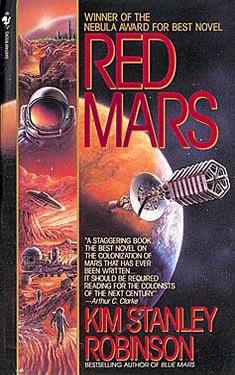Kim Stanley Robinson
Completed 11/25/2013, reviewed 11/25/2013
4 stars
Imagine James Michener writing hard SF. That’s “Red Mars.” Robinson blends vivid descriptions of the
Martian landscape and detailed science, sociology, and economics to bring to
life an epic depiction of the colonization of Mars and the personal and
cultural strife that ensues. Like
Michener, Robinson’s detail left me in awe, but when all was said and done, the
book left me exhausted and questioning my decision to read all three books of
the Martian trilogy in a row.
 The book begins with a short chapter which drops the reader amidst
the chaos of the Martian colony, creating an immediate tension and a burning
desire to understand how things collapsed so badly. The second chapter then whisks you back to
the beginning, describing the colonization, from the selection of the “first
hundred,” to the journey to Mars, and to the workings of making Mars a
scientific utopia. Of course, it never
is utopia, and as more colonists arrive, it quickly devolves into mayhem.
The book begins with a short chapter which drops the reader amidst
the chaos of the Martian colony, creating an immediate tension and a burning
desire to understand how things collapsed so badly. The second chapter then whisks you back to
the beginning, describing the colonization, from the selection of the “first
hundred,” to the journey to Mars, and to the workings of making Mars a
scientific utopia. Of course, it never
is utopia, and as more colonists arrive, it quickly devolves into mayhem.
The story is told in third person, but from the perspective
of several of the first hundred. Each
chapter (and sometimes two) is told from the point of view a few of the main
characters. Through them, we learn of
the hardship of this mission. I
particularly liked the chapter where Maya was the focus. She seemed the most fully realized. The other characters were less emotional, in
general. I ascribed this to the fact
that almost all the members of the first hundred are scientists, and thus have
scientists’ demeanors, probably testing ISTJ on the Myers-Briggs personality
type indicator. The side effect is that
as the story progresses through the others characters, Maya seems less like a fully
realized character and more like an annoying bipolar victim. I found this unfortunate, because I really
liked Maya and found everyone else to be a little too much like the Martian
landscape, primarily sterile.
Nonetheless, the characterization in general is very
detailed, giving you very different accounts of the progress of the
colony. I just would have liked to have
had the characters show more feelings.
The details of the science, the politics, and all other
aspects of a society are amazing. There
were times I could follow it, other times when my eyes just glazed over. Its clear Robinson is very smart and did a
lot of research, but I felt the detail, particularly to the landscape, was too
long. Halfway through the book, I found
myself skimming over descriptions of the landscape. Maybe that was intentional, reinforcing the
sterile majesty of Mars. But I kept
feeling like a good editor could have made it tighter and less rambling.
This is a 4 star book.
It is excellent, despite my problems with the length and lack of
emotionality. The development of the
society on Mars is amazing, and feels very realistic. It is not candy-coated in the least. Just because we leave the earth doesn’t mean
we leave all our problems as well. We’re
human, and we bring our chaos and conflict with us wherever we go. I look forward to the rest of the books in
the trilogy. The next book covers the
terraforming of Mars. I’m just hoping
the emotional state of the characters warm up as much as the planet does.
Your quibbles with the book echo some others that I've read about them which has made me reluctant to give them a try. I have yet to read KSR though I know many who are very passionate about the work.
ReplyDeleteRed Mars was tough, but I highly recommended. I'd consider it required reading, despite my issues with it. Unfortunately, my experience with "Red" has made it a little tough to jump right into "Green". When I sit down to read it, I keep finding other things to do like clean the bathroom...
DeleteYes, I just think life is too short and the reading pile too high to force myself to read. But I also think sometimes it is all about picking up the right book at the right time. I've went away from certain books in the past only to come back to them when the mood struck to find that I really enjoyed them, even if they had issues.
Delete